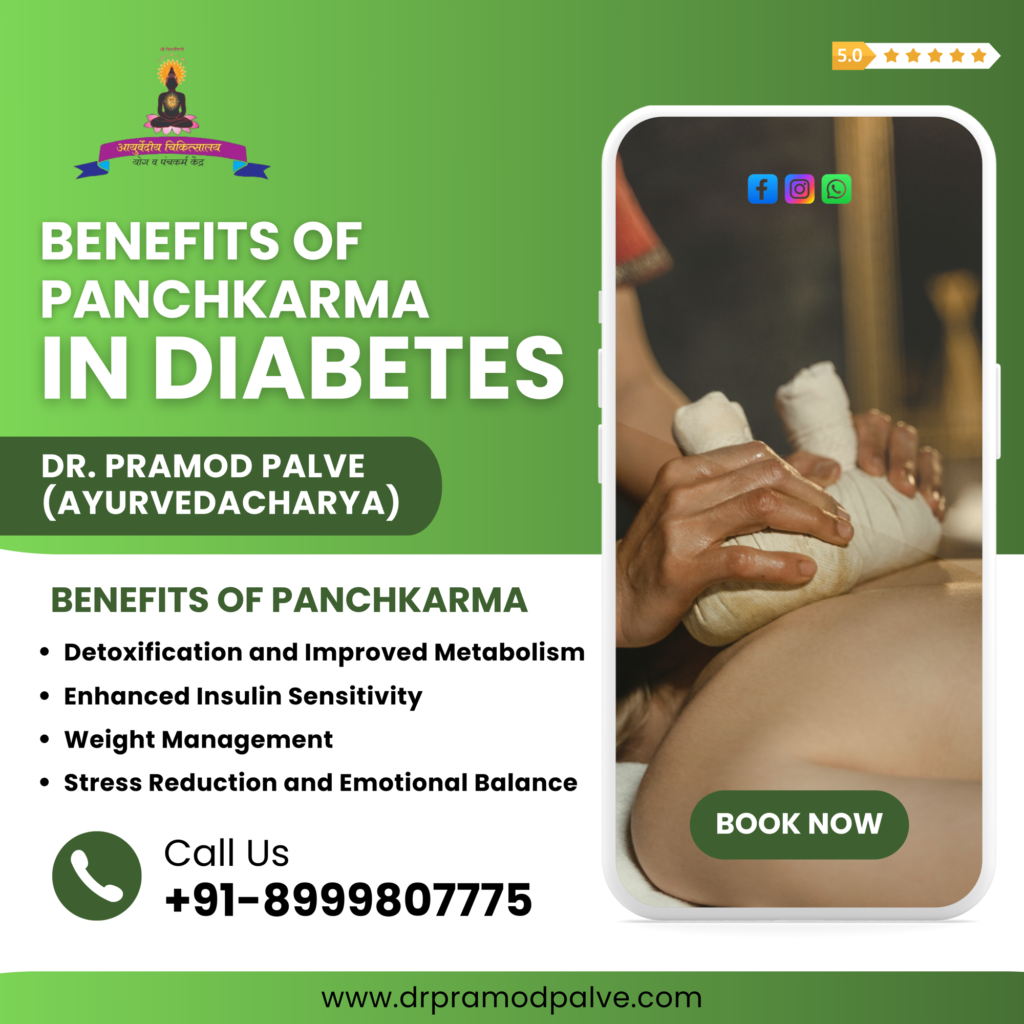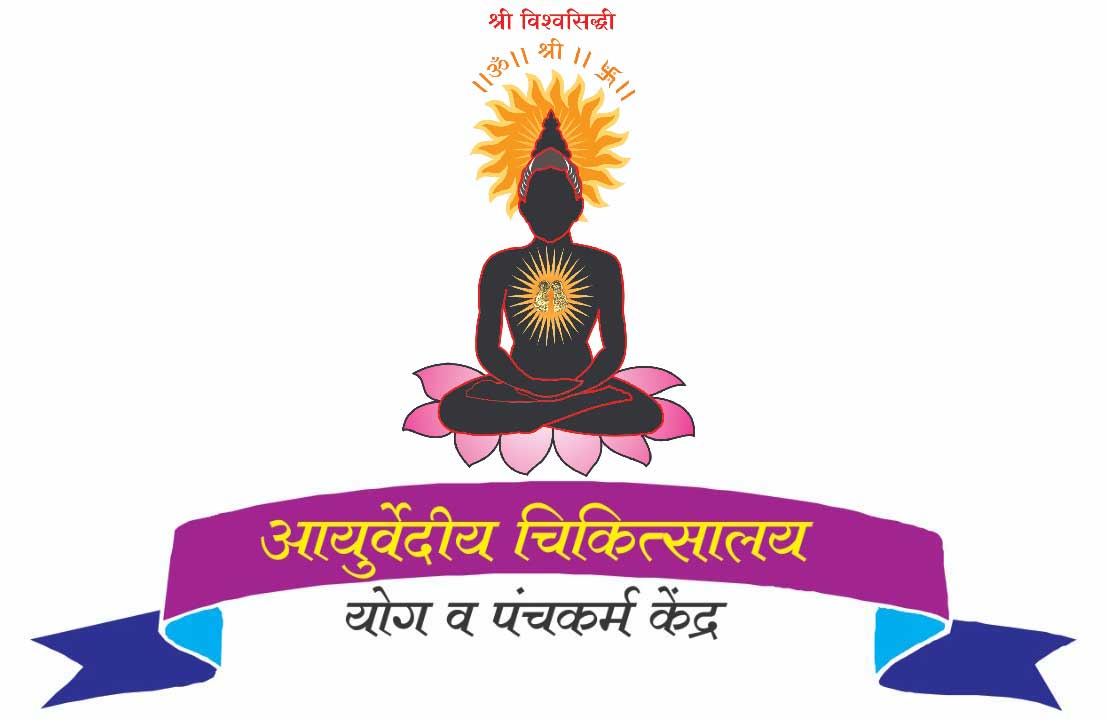Introduction
Diabetes, a chronic metabolic disorder characterized by elevated blood sugar levels, has become a global health concern. While modern medicine offers various treatments to manage diabetes, Ayurveda provides a natural, holistic approach that focuses on the root cause rather than just the symptoms. Ayurveda, coupled with Panchakarma therapy, offers a unique, effective way to control diabetes and improve overall health. For those seeking Ayurvedic solutions in Ahmednagar and Pune, Vishwasiddhi Ayurveda & Panchkarma Centre, managed by Dr. Pramod Palve, provides expert care in treating diabetes using traditional Ayurvedic and Panchakarma therapies.
Dr. Pramod Palve is a seasoned Ayurveda and Panchakarma practitioner with over 15 years of experience. Under his guidance, Vishwasiddhi Ayurveda & Panchkarma Centre has helped numerous patients manage diabetes naturally through personalized treatments. In this article, we will explore the benefits of Ayurveda and Panchakarma in controlling diabetes.

Understanding Ayurveda and Diabetes Management
In Ayurveda, diabetes is referred to as “Madhumeha,” a condition caused by imbalances in the body’s doshas—Vata, Pitta, and Kapha. According to Ayurvedic principles, the accumulation of toxins (Ama) in the body, combined with imbalances in the doshas, affects the body’s metabolism, leading to increased blood sugar levels. The Ayurvedic approach to managing diabetes focuses on:
- Balancing Doshas: Restoring the balance of Vata, Pitta, and Kapha doshas.
- Detoxification: Eliminating toxins (Ama) from the body through therapies like Panchakarma.
- Diet and Lifestyle Changes: Recommending specific dietary guidelines and lifestyle practices to support overall health.
The Role of Panchakarma in Diabetes Management
Panchakarma, a cornerstone of Ayurvedic therapy, is a detoxification process that helps remove toxins from the body and rejuvenate the tissues. It involves five primary procedures: Vamana (emesis), Virechana (purgation), Basti (medicated enema), Nasya (nasal administration), and Raktamokshana (bloodletting). These therapies help in controlling diabetes by cleansing the body, improving digestion, and enhancing the body’s metabolic rate.
1. Virechana (Purgation Therapy)
Virechana therapy involves the use of herbal laxatives to cleanse the digestive tract, liver, and intestines. This therapy helps in eliminating excess Pitta dosha from the body and reduces insulin resistance, which is a common issue in diabetes management. By improving liver function and metabolic processes, Virechana helps in regulating blood sugar levels.
Focus Keywords: panchkarma treatment in pune, best panchkarma doctor in pune, panchkarma treatment in maharashtra
2. Basti (Medicated Enema Therapy)
Basti therapy is considered highly effective for balancing the Vata dosha and improving the body’s metabolism. It involves the administration of medicated oils or herbal decoctions through the rectum. This therapy helps in cleansing the colon, improving digestion, and reducing inflammation, all of which are beneficial for managing diabetes.
Focus Keywords: best panchkarma center in ahmednagar, best panchkarma specialist in pune, best panchkarma specialist in ahmednagar
3. Abhyanga (Herbal Oil Massage)
Abhyanga, a form of full-body massage using warm herbal oils, helps in stimulating blood circulation, relaxing the muscles, and detoxifying the skin. For diabetic patients, Abhyanga can help reduce stress, improve blood circulation, and promote better insulin function, thereby aiding in blood sugar control.
4. Dietary and Lifestyle Recommendations
A significant part of Ayurvedic treatment for diabetes includes adopting a balanced diet and lifestyle. Patients are advised to consume foods that pacify the doshas, particularly Kapha, which is linked to diabetes. Emphasis is placed on consuming low-glycemic foods, whole grains, and green leafy vegetables. Regular exercise, yoga, and meditation are also encouraged to reduce stress and maintain a healthy weight.
Benefits of Ayurveda and Panchakarma in Controlling Diabetes
1. Holistic Approach to Diabetes Management
Unlike conventional treatments that focus solely on blood sugar control, Ayurveda takes a holistic approach by addressing the underlying causes of diabetes, such as poor digestion, stress, and a sedentary lifestyle. This approach not only helps in controlling blood sugar levels but also improves overall health and well-being.
2. Detoxification and Rejuvenation
Panchakarma therapies help detoxify the body by eliminating accumulated toxins, which is crucial in managing diabetes. Detoxification improves digestion, enhances nutrient absorption, and supports the body’s natural ability to regulate blood sugar.
3. Improved Insulin Sensitivity
Ayurvedic herbs and Panchakarma therapies have been shown to improve insulin sensitivity, making it easier for the body to use insulin effectively. This can help reduce the dependency on external insulin and medications.
4. Stress Reduction and Emotional Balance
Stress is a significant factor that can worsen diabetes symptoms. Ayurvedic treatments, including Panchakarma, Abhyanga, and meditation, help in reducing stress and anxiety levels, which in turn helps in maintaining stable blood sugar levels.
5. No Side Effects
Ayurvedic treatments for diabetes are natural and free from harmful chemicals, making them safe and effective without causing any side effects. Herbal remedies and Panchakarma therapies are tailored to suit individual needs, ensuring a gentle yet powerful approach to managing diabetes.
6. Personalized Treatment Plans
At Vishwasiddhi Ayurveda & Panchkarma Centre, Dr. Pramod Palve and his team provide personalized treatment plans for each patient based on their unique constitution (Prakriti), dosha imbalances, and health condition. This ensures that the treatment is effective and tailored to achieve optimal results.
Why Choose Vishwasiddhi Ayurveda & Panchkarma Centre for Diabetes Management?
Vishwasiddhi Ayurveda & Panchkarma Centre, located in Ahmednagar and Pune, is renowned for its expertise in Ayurvedic and Panchakarma therapies. Here are a few reasons to choose this center for diabetes management:
- Experienced Practitioners: Led by Dr. Pramod Palve, a highly experienced Ayurveda and Panchakarma specialist, the center is known for its effective treatments and holistic approach.
- Comprehensive Care: The center offers a range of Ayurvedic and Panchakarma therapies designed to detoxify the body, balance the doshas, and rejuvenate the mind and body.
- Personalized Treatment Plans: Each patient receives a personalized treatment plan based on their unique needs and health conditions, ensuring the most effective results.
- State-of-the-Art Facilities: Equipped with modern facilities, the center ensures that all treatments are administered with the highest standards of care.
Conclusion
Controlling diabetes naturally through Ayurveda and Panchakarma offers a comprehensive and holistic approach to health. By addressing the root causes of diabetes and providing personalized care, Ayurveda helps in managing blood sugar levels, improving overall health, and enhancing the quality of life. Vishwasiddhi Ayurveda & Panchkarma Centre, under the guidance of Dr. Pramod Palve, offers specialized care in managing diabetes and other chronic conditions. If you’re looking for natural and effective ways to control diabetes, this center is the ideal choice.
FAQs
- Can Ayurveda completely cure diabetes?
Ayurveda focuses on managing diabetes by balancing the doshas and detoxifying the body. While it may not completely cure diabetes, it can significantly help in controlling blood sugar levels and improving overall health. - How long does it take to see results with Ayurvedic treatment for diabetes?
The time to see results varies depending on the individual’s condition, severity of diabetes, and adherence to the treatment plan. Some patients may notice improvements within a few weeks, while others may require longer. - What are the side effects of Ayurvedic treatment for diabetes?
Ayurvedic treatments are natural and generally free from side effects. However, it’s important to consult a qualified practitioner to ensure that the treatment is safe and appropriate for your condition. - Can Panchakarma therapy help in reducing the need for diabetes medication?
Yes, Panchakarma therapy helps in detoxifying the body and improving insulin sensitivity, which may reduce the need for medications. However, this should always be done under medical supervision.
For more info. Visit our website: www.drpramodpalve.com
